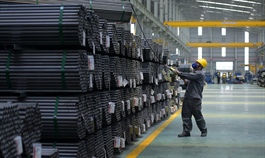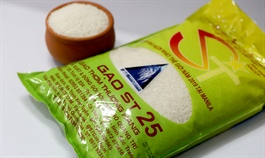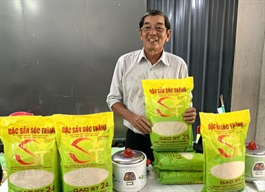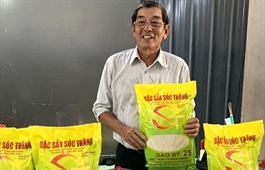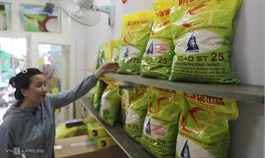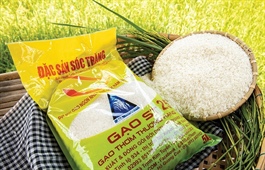Steel prices increase on global issues: ministry
Steel prices increase on global issues: ministry
Soaring raw material prices coupled with delays in shipping due to the COVID-19 pandemic significantly pushed up steel prices recently, according to the Ministry of Industry and Trade. 
The price of steel in the domestic market increased by up to 45 per cent in recent months. The ministry’s Industry Agency said that the input costs of the steel industry largely depended on the prices of raw materials in the global market which has seen whopping increases recently.
Viet Nam was reliant on imported raw materials for steel production, including iron ore, scrap steel, fat coal and graphite electrodes.
It was predicted that Viet Nam would have to continue importing many types of raw materials for steel production this year with more than 18 million tonnes of iron ore, 6 - 6.5 million tonnes of scrap steel, 6.5 million tonnes of fat coal and 10,000 tonnes of graphite electrode.
The prices of these raw materials were predicted to remain at high levels, which would directly affect steel production in the domestic market. The steel sector was expected to run a trade deficit this year, after a deficit of more than US$6.4 billion in 2020.
The agency also pointed out that delays in shipping due to the impacts of the COVID-19 pandemic also pushed up steel production costs.
In response, the Ministry of Industry and Trade proposed to the Government policies to stabilise domestic steel supply and demand.
Specifically, the ministry proposed that the import taxes on some steel products which saw huge increases in prices should be put under consideration.
The Ministry of Construction was used to provide forecasts about steel demand this year to ensure a balance with the supply in the domestic market and for exports, which would serve as a basis for steel producers to be active in raising their production plans and increase efficiency.
For the long term, the Ministry of Industry and Trade would increase the application of trade defence instruments to promote the development of domestic steel producers and to meet the steel demand for the domestic market and export.
In an effort to promote domestic steel production, the Ministry of Industry and Trade urged the Government to introduce incentive policies to attract investment in new production or production expansion, especially in the production of hot-rolled steel which was facing a severe shortage.
Regarding the accusation of the Viet Nam Association of Construction Contractors that steel makers were working together to push up steel prices in the domestic market, the Ministry of Industry and Trade said the claim was groundless.
The ministry pointed out that the Vietnamese economy was expected to expand at more than six per cent this year with the demand for steel ingots to increase by six per cent and steel products by 2 - 3 per cent over last year. The steel demand was estimated to total around 27 million tonnes this year.
Regarding construction steel supply, the ministry said that with new projects operational in 2020, including Hoa Phat Dung Quat Iron and Steel Integrated Complex and Nghi Son Steel Complex, the domestic production capacity reached about 14 million tonnes which could fully meet domestic demand and exports.
However, for hot-rolled coil, the domestic capacity was estimated at around 5 - 6 million tonnes. Last year, Viet Nam had to import 10 million tonnes of hot-rolled coil and was forecast to continue importing this product this year to meet domestic demand.
The ministry predicted that steel prices might reach a new level as the pandemic was still developing globally. However, when the virus was put under control, the steel prices would follow the market supply and demand.







